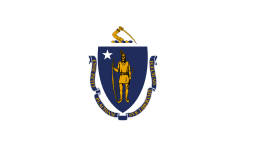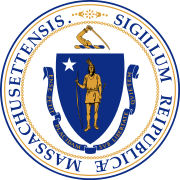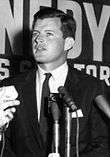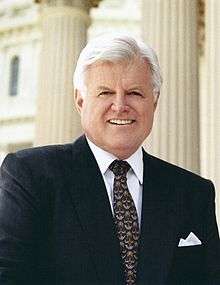United States Senate special election in Massachusetts, 1962
United States Senate special election in Massachusetts, 1962

|
|
|
|
|
|
|
The United States Senate special election of 1962 in Massachusetts was held on November 6, 1962.
History
Senator John F. Kennedy resigned the seat to become President of the United States after winning the presidential election in 1960. Benjamin A. Smith II, a Kennedy family friend, was appointed to succeed Kennedy, serving as a placeholder for Edward M. "Ted" Kennedy, who at the time was too young to be constitutionally eligible for the seat.[1]
Ted Kennedy first faced a Democratic Party primary challenge from Edward J. "Eddie" McCormack, Jr., the state Attorney General. Kennedy's slogan was "He can do more for Massachusetts", the same one John had used in his first campaign for the seat ten years earlier.[2] McCormack had the support of many liberals and intellectuals, who thought Kennedy inexperienced ("I back Jack but Teddy ain't ready") and knew of his suspension from Harvard, a fact which subsequently became public during the race.[3] Kennedy also faced the notion that with one brother President and another U.S. Attorney General, "Don't you think that Teddy is one Kennedy too many?"[1] But Kennedy proved to be an effective street-level campaigner.[1] In a televised debate, McCormack said "The office of United States senator should be merited, and not inherited," and said that if his opponent's name was Edward Moore rather than Edward Moore Kennedy, his candidacy "would be a joke."[3] Voters thought McCormack's performance overbearing; combined with the family political machine's finally getting fully behind him, Kennedy won the September 1962 primary by a two-to-one margin.[1]
In the Republican primary, George C. Lodge, a former member of the Eisenhower administration and the son of Henry Cabot Lodge, defeated Representative Laurence Curtis (MA-10). Harvard historian H. Stuart Hughes also ran for the Senate seat as an independent peace candidate. [4]
In the November special election, Kennedy defeated Lodge, whose father had lost this seat to then-Representative John F. Kennedy in 1952. In winning, Kennedy gained 55 percent of the vote.[1][5]
Results
Primaries
- Source: Our Campaigns - MA US Senate - D Primary Race - Sep 18, 1962
General election
- Source:[6]
References
|
|---|
|
| General | |
|---|
|
| Mass. Senate | |
|---|
|
| Mass. House | |
|---|
|
Governor
(with winners) | |
|---|
|
| Gov.'s Council |
- 2002
- 2006
- 2010
- 2012
- 2014
- 2016
|
|---|
|
| U.S. President | |
|---|
|
U.S. Senate
(with winners) | |
|---|
|
| U.S. House |
- 1788
- 1790
- 1792
- 1794
- 1796 [sp: 1st d., 10th d.]
- 1797 [sp: 11th d.]
- 1798
- 1800 [sp: 3rd d., 4th d., 10th d.]
- [[Massachusetts's 4th congressional district special election, 1801|1801 [sp: 4th d.]], 12th d., 14th d.]
- 1802
- 1804 [sp: 12th d.]
- 1806
- 1807 [sp: 12th d.]
- 1808 [sp: 2nd d.]
- 1810 [sp: 10th d., 11th d.]
- 1811 [sp: 4th d.]
- 1812 [sp: 17th d.]
- 1814 [sp: 4th d., 12th d.]
- 1816 [sp: 11th d.]
- 1817 [sp: 1st d.]
- 1818 [sp: 20th d.]
- 1820 [sp: 1st d., 8th d., 13th d.]
- 1822
- 1823 [sp: 10th d.]
- 1824 [sp: 10th d.]
- 1826
- 1828
- 1830
- 1832
- 1834
- 1836
- 1838
- 1840
- 1842
- 1844
- 1846
- 1848
- 1850
- 1852
- 1854
- 1856
- 1858
- 1860
- 1862
- 1864
- 1866
- 1868
- 1870
- 1872
- 1874
- 1876
- 1878
- 1880
- 1882
- 1884
- 1886
- 1888
- 1890
- 1892
- 1894
- 1896
- 1898
- 1900
- 1902
- 1904
- 1906
- 1908
- 1910
- 1912
- 1914
- 1916
- 1918
- 1920
- 1922
- 1924
- 1926
- 1928
- 1930
- 1932
- 1934
- 1936
- 1938
- 1940
- 1942
- 1944
- 1946
- 1948
- 1950
- 1952
- 1954
- 1956
- 1958
- 1960
- 1962
- 1964
- 1966
- 1968
- 1970
- 1972
- 1974
- 1976
- 1978
- 1980
- 1982
- 1984
- 1986
- 1988
- 1990
- 1992
- 1994
- 1996
- 1998
- 2000
- 2001 [sp: 9th d.]
- 2002
- 2004
- 2006
- 2007 [sp: 5th d.]
- 2008
- 2010
- 2012
- 2014
- 2016
|
|---|
|
|


